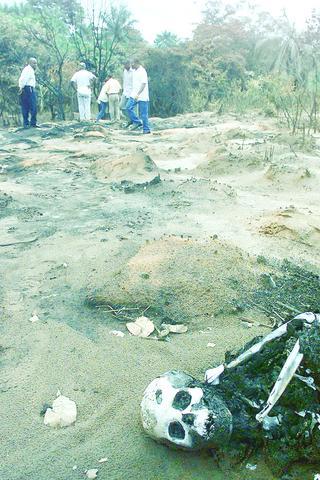Angry villagers lashed out at Nigeria's state oil company on Sunday for not repairing a vandalized pipeline that gushed fuel for weeks before exploding, killing at least 125 people.
Charles Onoha, chief of the village of Onicha Amiyi-Uhu, said he and other elders alerted officials of the Nigerian National Petroleum a month ago that the pipeline in southeastern Nigeria had been ruptured.

PHOTO: AP
"We begged NNPC to stop the spillage, but they did nothing," Onoha told reporters. "They should be held responsible for this disaster."
The death toll from the explosion rose to 125 people, mainly unemployed youths and children scavenging the flammable fluids, according to Nigerian Red Cross figures released late on Sunday.
Nigerian Red Cross president Emmanuel Ijewere said that figure was likely to rise as rescuers collect more bodies and interview survivors.
The 10-year-old pipeline pumps kerosene, diesel and gasoline from a refinery in Port Harcourt to the southeastern city of Enugu. Residents said vandals frequently puncture the pipe and young men collect the gushing fuel in jerry-cans and barrels and resell it -- a practice known as "scooping" or "bunkering."
Ndu Ughamadu, a state spokesman for the oil company, said he and other officials first became aware of the leakage after the explosion Thursday night. But he said company policy was to continue pumping fuel during "minor leakages."
"We have more than 5,000km of pipeline to monitor. At the same time we have a serious fuel scarcity in this country," Ughamadu said from Abuja, Nigeria's capital. "We cannot afford to halt supplies unless the breakage is a serious one."
The blast was touched off by a spark from a motorcycle used by one of the victims, said Solomon Ibe, a 21-year-old farmer who was walking by at the time.
"I saw a boy kickstart his motorcycle, and then suddenly there was fire everywhere and everyone was running randomly to escape," Ibe said.
Innocent Chiege, a village medical doctor, accused the state company of negligence.
"We had called on them for surveillance of the pipeline to stop leakages and prevent disasters. But they did not listen," Chiege said.
Residents picked through the blackened forest surrounding the site Sunday in search of missing relatives. The rotting, charred remains of 20 people, many burned to bone and white ash, could be seen in tangled thickets of blackened bush.
Word of the disaster emerged slowly because many survivors apparently feared prosecution for theft and sabotage, Ijewere said.
Pipeline vandalism is common in Nigeria and thousands have been killed in explosions in recent years, including more than 1,000 in a 1998 blast in the Niger River delta town of Jesse.
The government has tried to educate villagers about the danger of scavenging pipeline fuel. But the practice continues, spurred by poverty and anger at the government and oil industry for allegedly polluting the environment and financially neglecting the oil-rich delta.
Nigeria is Africa's largest petroleum exporter and the fifth-largest source of oil exports to the US.

Four people jailed in the landmark Hong Kong national security trial of "47 democrats" accused of conspiracy to commit subversion were freed today after more than four years behind bars, the second group to be released in a month. Among those freed was long-time political and LGBTQ activist Jimmy Sham (岑子杰), who also led one of Hong Kong’s largest pro-democracy groups, the Civil Human Rights Front, which disbanded in 2021. "Let me spend some time with my family," Sham said after arriving at his home in the Kowloon district of Jordan. "I don’t know how to plan ahead because, to me, it feels

Polish presidential candidates offered different visions of Poland and its relations with Ukraine in a televised debate ahead of next week’s run-off, which remains on a knife-edge. During a head-to-head debate lasting two hours, centrist Warsaw Mayor Rafal Trzaskowski, from Polish Prime Minister Donald Tusk’s governing pro-European coalition, faced the Eurosceptic historian Karol Nawrocki, backed by the right-wing populist Law and Justice party (PiS). The two candidates, who qualified for the second round after coming in the top two places in the first vote on Sunday last week, clashed over Poland’s relations with Ukraine, EU policy and the track records of their

‘A THREAT’: Guyanese President Irfan Ali called on Venezuela to follow international court rulings over the region, whose border Guyana says was ratified back in 1899 Misael Zapara said he would vote in Venezuela’s first elections yesterday for the territory of Essequibo, despite living more than 100km away from the oil-rich Guyana-administered region. Both countries lay claim to Essequibo, which makes up two-thirds of Guyana’s territory and is home to 125,000 of its 800,000 citizens. Guyana has administered the region for decades. The centuries-old dispute has intensified since ExxonMobil discovered massive offshore oil deposits a decade ago, giving Guyana the largest crude oil reserves per capita in the world. Venezuela would elect a governor, eight National Assembly deputies and regional councilors in a newly created constituency for the 160,000

North Korea has detained another official over last week’s failed launch of a warship, which damaged the naval destroyer, state media reported yesterday. Pyongyang announced “a serious accident” at Wednesday last week’s launch ceremony, which crushed sections of the bottom of the new destroyer. North Korean leader Kim Jong-un called the mishap a “criminal act caused by absolute carelessness.” Ri Hyong-son, vice department director of the Munitions Industry Department of the Party Central Committee, was summoned and detained on Sunday, the Korean Central News Agency (KCNA) reported. He was “greatly responsible for the occurrence of the serious accident,” it said. Ri is the fourth person